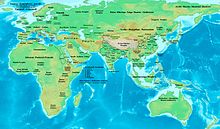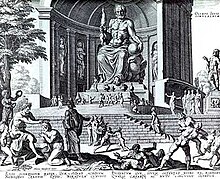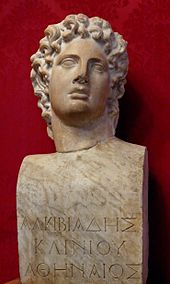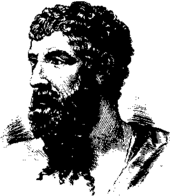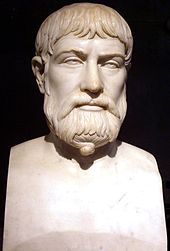5th century BC Chr.
Portal history | Portal Biographies | Current events | Annual calendar
◄ |
2nd mill. Chr. |
1st millennium BC Chr. |
◄ |
7th century BC Chr. |
6th century BC Chr. |
5th century BC Chr. |
4th century BC Chr. |
3rd century BC Chr. |
►
The 5th century BC Chr. Began on January 1 v 500th Chr. And ended on December 31 v four hundred and first Chr.
Age / Epoch
The heyday and beginning of decline of ancient Greece .
Events / developments
Greece
- Beginning of the 5th century BC BC: King Alexander I of Macedonia becomes an Olympian at the Olympic Games .
- First written mention of Europe by the writer Hekataios of Miletus
- 494 BC Chr .: Histiaios , tyrant of Miletus and satrap of the Persian king, moves against the north Aegean islands of Chios and Lesbos and besieges Thasos .
- 493 BC Chr .: On the initiative of Themistocles , Athens expands its port of Piraeus .
- 492 BC Chr .: Persian campaign under Mardonios to Thrace and Macedonia
- 490 BC Chr .: Persian expedition under Datis against Eretria and Athens
- 490 BC BC, September 12th (traditional dating): Battle of Marathon : defeat of the Persian army under Datis against the Attic hoplite army under Miltiades . The legend of the messenger who rushes to Athens to bring the news of victory is the basis of the marathon .
- 490 BC Chr .: Leonidas I succeeds his half-brother Kleomenes I as king in Sparta .
- 489 BC Chr .: Unsuccessful campaign by Athens under Miltiades against Paros . Because of this defeat, Miltiades is charged and sentenced to prison; he soon dies in custody.
- 487 BC BC: War between Athens and Aegina (until 481 BC)
- 487 BC Chr .: The Athenian archons are from now on determined by a lottery procedure after a preselection; thus further democratization of the constitution. First banishment of a politician (Hipparchus) by ostracism
- 482/481 BC Chr .: Themistocles runs a fleet building program in Athens and the expansion of a war port in Piraeus. His political opponents were exiled to Ostrakismos: Megakles (486 BC), Xanthippos (484 BC) and Aristeides (483 BC). The thetes are admitted to military service.
- 481 BC Chr .: At a conference in Corinth a Panhellenic combat alliance (Symmachie) is arranged in anticipation of the Persian attack .
- 480 BC BC, spring: Persian king Xerxes I moves to Greece with an army of over 100,000 men.
- 480 BC Chr., August 11th: First battle of Thermopylae , simultaneous naval battle of Cape Artemision. Spartan king Leonidas falls with his 300-strong bodyguard and around 1,000 thespians while securing the Thermopylae pass in order to secure the retreat of the Greek army and the detachment of the Greek fleet from the enemy, followed by the sacking of Athens by the Persians and the destruction of the Acropolis .
- 480 BC BC, September: Battle of Salamis . Themistocles of Athens lures the Persian fleet into an ambush in the sound of Salamis Island . The Greek fleet, with its rowing ships, is superior to the much larger Persian fleet, which can only operate with difficulty in a confined space.
- 479 BC Chr., August 27th: On or around this day the Greeks succeed in driving the Persians out of Greece through the victory in the Battle of Platää and the almost simultaneous naval battle of Mykale . The further course of the Persian Wars no longer seriously endangers the small Greek states.
- 479 BC Chr .: loss of Persian naval rule, rise of Athens
- 479 BC Chr .: Construction of the city wall of Athens against the opposition of the Spartans

The Deli-Attic League, shortly before the outbreak of the Peloponnesian War
- 477 BC BC: The city-state of Athens founds the Delisch-Attic League .
- 477 BC Chr .: Pausanias, victor of Platää, after being suspected of conspiracy with the Persians in Sparta, goes to Byzantium , where he lived until 471 BC. Chr. Prevails.
- 476 BC BC: Archidamos II becomes king in Sparta .
- 475 BC Chr .: Eion in Thrace becomes a member of the Attic League. The federal government also subjugates the island of Skyros and the city of Karystos on Euboea .
- 472 BC Chr .: performance of the drama The Persians by Aeschylus .
- Around 471 BC Chr .: Themistocles is banished from Athens by ostracism; he flees to the Persians, who make him a satrap in Magnesia.
- 468 BC Chr .: Sophocles wins a poetry contest against Aeschylus in Athens.
- Around 467 BC BC: The island of Naxos falls away from the Attic League.
- Around 466 BC Chr .: Battle of Eurymedon : Victory of the Athenians under Kimon over the Persians in a combined land and sea battle on the coast of Pamphylia
- 465/463 BC BC: The island of Thasos falls away from the Attic League. After a few years it is subjected to violence.
- 464 BC Chr .: Defeat of the Attic League against the Thracian Edonians at Drabeskos, after the Athenians had established the colony Amphipolis on the coast .
- 464 BC Chr .: Severe earthquake in Sparta, over 20,000 deaths. The Helots use the situation to revolt against Sparta: 3rd Messenian War.
- 463 BC Chr., April 30th: Total solar eclipse in southern Italy and northern Greece
- 462/461 BC Chr .: Democratic reforms of the Ephialtes in Athens: the Areopagus is largely disempowered, its powers pass to the council of 500 and the popular assembly.
- 461 BC Chr .: Alienation between Athens and Sparta: The representative of the aristocrats in Athens, Kimon, had accepted a Spartan request for help against the rebellious helots and put 4,000 hoplites on the march. When Ephialtes introduced democratic reforms in Athens, Sparta sent the Athenian auxiliaries back for fear of the spread of democratic ideas. In Athens, Kimon then succumbs to ostracism, and the democrats prevail here, even if Ephialtes is murdered by followers of Kimon in the same year. Perikles continued his work, who ensured the independence of the members of the council and the courts with the introduction of daily allowances ( diets ). Athens occupies Pagai as a port city.
- Around 460 BC Chr .: After their defeat in the 3rd Messenian War against Sparta, the Messenians are settled in Nafpaktos with the help of Athenians . Athens allies itself with Megara and Thessaly , Sparta with Aegina and Corinth.
- 460-457 BC BC: Construction of the Long Walls between Athens and Piraeus
- 458 BC Chr .: performance of the Oresty of Aeschylus
- 458-450 BC Chr .: reforms under Pericles
- 457 BC Chr .: Completion of the Temple of Zeus at Olympia
- 457 BC Chr .: A critical situation arises for Athens due to the alliance of Sparta with Thebes. It comes to the First Peloponnesian War : Victory of the Spartans at Tanagra , but this is followed by an Athenian victory over Boeotia at Oinophyta . Athens ruled Boiotia, Phocis and Lokris for around ten years .
- 456 BC Chr .: Aegina is forced to become a member of the Attic League and surrender its fleet to Athens.
- 455 BC Chr .: Naval expedition of the Athenian general Tolmides to Zakynthos and Kefalonia , which are won as allies of Athens.
- 454 BC Chr .: Egyptian catastrophe : An Athenian aid fleet with 200 ships, the Inaros, the son of the former Egyptian king Psammetich III. , wanted to help shake off the Persian foreign rule, is wiped out by the Persians near the island of Propositis in the Nile Delta. In response, Athens moves the Federal Treasury of the League from Delos to Athens.
- 451 BC Chr .: Kimon, who returns from exile, mediates a five-year armistice between Athens and Sparta.
- Around 450 BC Chr .: Victory of the Greek fleet over the Persians at Salamis ( Cyprus )
- 449 BC Chr .: Peace of Callias : The Persian Empire concludes a compromise peace with Athens. Conversion of the Attic League into an instrument of power.
- Around 448 BC Chr .: Phidias completes the 9 m high bronze statue of Athena in the Parthenon temple of the Athens Acropolis.
- 447 BC Chr .: A panhellenic peace congress called by Pericles to Athens fails due to resistance from Sparta.
- 447 BC BC: Boeotia rising against Athens. Battle of Koroneia : The Athenians are driven out of central Greece.
- 446 BC Chr .: Euboea, Megara, Andros and Naxos fall away from the Attic League.
- 446 BC Chr .: Athens and Sparta conclude a temporary peace for 30 years on the basis of the status quo: mutual recognition of domains.
- 443 BC Chr .: Pericles has his most important political opponent, Thucydides , rendered harmless through ostracism. Until the Peloponnesian War, Pericles held an undisputed position of power in the Athenian democracy (“Periclean Age”). Art flowering through government building contracts; Alimentation of the population of Athens, financed by tribute payments from allies.
- 442 BC Chr .: The Antigone of Sophocles is performed.
- 440 BC Chr .: Samos defection from the Attic League, which subjugates the island by force.
- 438 BC Chr .: Completion of the Parthenon temple.
- 438 BC BC: The Greek sculptor Phidias starts work on the Zeus statue in the Temple of Zeus at Olympia .
- 437/436 BC Chr .: settlement of Athenian settlers in the Thracian Amphipolis
- Around 436 BC Chr .: In an internal conflict in the city of Epidamnos the democratic party Corinth, the oligarchic party Kerkyra calls for help.
- 434 BC Chr .: Methone in the Thermean Gulf comes under the control of Athens.
- 433 BC Chr .: Concerned about the fleet armament of Corinth, Athens sides with Kerkyra. Corinth then turns to Sparta. Between Kerkyra and Corinth there is a sea battle at the Sybota Islands , which Corinth wins without daring to land on Kerkyra.
- 433 BC BC: Athens imposes a trade ban on its old rival Megara ( Megaric Psephisma ).
- 432 BC Chr .: Athens takes action against the Corinthian colony Potidaia in the Chalkidike; it can defeat the troops of Potidaia and Corinth in the battle of Potidaia .
- 431-403 BC Chr .: Peloponnesian War
- 431-421 BC Chr .: Archidamian War
- 431 BC BC, spring: The Peloponnesian War begins with the attack of Thebes, an ally of Sparta, on Platää.
- 430 BC Chr .: typhus epidemic in Athens
- Around 430 BC Chr .: Phidias completes his Zeus statue from Olympia , one of the seven wonders of the world .
- 429 BC BC: The Athenians are able to take Potidaia after a long siege, but are defeated in the Battle of Spartolus . In the naval battle of Naupaktos , the Athenian fleet wins a victory over the Spartans and Corinthians. After Pericles died of typhus, Kleon heads Athenian politics.
- 429-427 BC BC: Siege of Plataiai ; after being captured by the Spartans, the defenders are executed.
- 428 BC Chr .: Mytilini on Lesbos renounces Athens, but is subjugated again by this.
- 427 BC Chr .: First Sicilian expedition of the Athenians
- 426 BC BC: In the battle of Tanagra , Athens wins a victory over the Thebans. In the Battle of Olpai on the Gulf of Ambrakia , Athens wins a victory over Sparta.
- 425 BC Chr .: A severe earthquake shakes Athens, thousands dead.
- 425 BC BC: The Athenians achieve important victories against the Spartans in the southwest of Messenia near Pylos and the island of Sphakteria . 120 full Sparti citizens are taken prisoner.
- 424 BC Chr .: Spartan army reform of Brasidas . With a campaign to Thrace, Brasidas succeeds in persuading the coastal cities there to desert Athens. Thucydides is held responsible for the loss of Amphipolis and sent into exile. In the Battle of Delion , Boeotia triumphs over the Athenians.
- 422 BC BC: Battle of Amphipolis : victory of the Spartans under Brasidas over the Athenians under Cleon; the death of the two generals clears the way to peace.
- 421 BC Chr .: The Nicias Peace leads to a break of several years in the Peloponnesian War. The fighting continues on sidelines.
- 420 BC Chr .: Athens concludes an alliance with Argos , Mantinea and Elis , which is directed against Sparta.
- 419 BC Chr .: Sparta attacks Argos.
- 418 BC Chr .: Battle of Mantineia : victory of the Spartans over Argos and Athens
- 416 BC Chr .: Athens subjugates the apostate Melos , the male population is slain, women and children enslaved (see: Melierdialog ).
- 415 BC Chr .: Athens decides an expedition to Sicily under the generals Nikias , Alkibiades and Lamachos .
- 415 BC BC, May 11th: In Athens , marble statues of the god Hermes with a severed head are found in the morning . During the night the so-called Hermenfrevel was committed by an unknown hand . The general Alkibiades , who is later accused and flees from Sicily to Sparta, is therefore suspected .
- 414 BC Chr .: Beginning of the siege of Syracuse by the Athenians
- 413 BC Chr .: A second army was sent to Syracuse under the strategists Demosthenes and Eurymedon . Defeat and capture of the Athenians off Syracuse.
- 413 BC Chr .: beginning of the Decelean War ; Sparta conquers the Dekeleia fortress in Attica.
- 413 BC BC: Archelaos I becomes king of Macedonia.
- 412 BC Chr .: Sparta wins Persia as an ally from whom it receives aid money; in return Sparta surrenders the Ionian cities of Asia Minor.
- 412 BC Chr .: Klazomenai falls away from Athens and is subject to it again.
- 411 BC Chr .: In Athens the oligarchical council of the four hundred seizes power, but it is overthrown in the same year. Democracy is strengthened, and the general right to sue is introduced. Sea battle of Syme between Athens and Sparta ends in a draw. Athens defeats Sparta in the naval battle of Kynossema on the Hellespont .
- 411 BC Chr .: Aristophanes writes the pacifist comedy Lysistrata .
- 410 BC Chr .: Athens victory over Sparta at Kyzikos . A spartan peace offer is rejected.
- 410 BC Chr .: Unsuccessful attempt to overthrow the oligarchic party in Kerkyra
- 409 BC Chr .: Athens tries in vain to take Ephesus .
- 409 BC Chr .: Pausanias becomes king in Sparta.
- 408 BC BC: Alkibiades recaptured Chalcedon and Byzantium for Athens. After his military successes on the Hellespont and the Bosporus, Alkibiades made a triumphal entry into Athens and was elected strategist. Beginning of the siege of Andros .
- 407 BC BC: The Athenians win back Abdera and Thasos.
- 407 BC Chr .: In Sparta Lysander takes over the warfare. The Spartans succeed in the battle of Notion near Ephesus an important naval victory over Athens. Alkibiades is relieved of his offices.
- 406 BC BC: Battle of the Arginus Islands: The Athenians won the greatest naval battle of the Peloponnesian War against the Spartans. In the Arginusen trial, however, Athens condemns its own strategists to death for failing to rescue shipwrecked people.
- 405 BC Chr .: In the battle of Aigospotamoi on the Hellespont, the Spartans manage to destroy the Athenian fleet in a flash. The Spartans then begin the siege of Athens, which is now cut off from sea food transport.
- 404 BC Chr .: Athens surrenders to Sparta; Dissolution of the League. Razing the Long Walls; Spartan hegemony, which obliges the other city-states to succumb to the army. In Athens, Sparta introduces the oligarchy ( rule of thirty ).
- 403 BC Restoration of democracy in Athens. Official introduction of the Milesian alphabet in Athens.
- 402 BC BC, January 18th: Total solar eclipse in Greece
- 401 BC Chr .: Agesilaus II becomes king in Sparta.
Italy
- 500 BC Chr .: Taranto is a monarchy.
- 498 BC BC: The tyrant Hippocrates of Gela in Sicily subjugates the neighboring city of Leontinoi .
- 497 BC Chr .: establishment of Saturnalia
- 496 BC BC: Victory of the Romans over the Latins in the battle of Regillus lacus
- 494 BC Chr .: Exodus of the plebeians to the Mons Sacer ("secessio plebis"). The patricians give in: The office of tribune is introduced in Rome .
- 493 BC Chr .: A treaty of alliance between Latins and Romans ends the First Latin War . Rome has to recognize the autonomy of the Latin cities, but has supreme command in the federal government. The (probably legendary) According to tradition, the Romans conquered under Coriolanus the Volscian city Corioli, south of the Alban Hills.
- 491 BC Chr .: Gelon becomes a tyrant in Gela, Sicily .
- 486 BC Chr .: The hernians join the Latin military community under the leadership of Rome.
- 485 BC Chr .: Gelon, tyrant in Gela, becomes ruler in Syracuse ; in Gela he uses his brother Hieron as a tyrant.
- 482-474 BC BC: First war between Rome and Veji
- 480 BC BC, autumn: Battle of Himera ; allegedly on the day of the Battle of Salamis the Greek troops of Syracuse under Gelon defeated the Carthaginians allied with the Persians under Hamilcar and thus prevented the conquest of Sicily by Carthage.
- 477 BC BC: The Romans are defeated in the war against Veji.
- 476 BC Chr .: The greatest Greek choral lyricist Pindar is appointed to the court of the tyrant Hieron I in Syracuse.
- 474 BC BC: Naval battle of Kyme , the Etruscans are defeated by the Greeks and lose their influence in southern Italy.
- 466 BC BC: The Illyrian Japygians defeat the Greek city of Taranto, where the aristocratic rule of the Pythagoreans is shaken off and democracy is introduced.
- 460 BC Chr .: Cincinnatus becomes consul of the Roman Republic .
- 458 BC Chr .: According to tradition, Cincinnatus was briefly made dictator of the Roman Republic in order to fend off the Aequer , whom he defeated on Mons Algidus .
- 454 BC BC: War between the Sicilian cities Segesta and Selinunt
- 451 BC Chr .: The Roman Republic convenes a ten-man college ( decemviri ), whose task is the codification of the applicable law.
- 450 BC Chr .: The Decemviri create the Twelve Tables law as a collection of laws of the Roman Republic.
- 443 BC BC: Founding of the Greek colony Thurioi in southern Italy
- 443 BC BC: The office of censor is introduced in Rome .
- 439 BC Chr .: According to tradition, Cincinnatus is called again to dictator of the Roman Republic.
- 432 BC Chr .: Greek colonists from Taranto and Thurii found Herakleia .

The route taken by the Athenian fleet and the Trieres were not suitable for the high seas, so they drove near the coast
- 424-420 BC Chr .: The Samnites bring Campania under their rule.
- 415-413 BC Chr .: " Sicilian Expedition ". Athens supports Segesta against Syracuse and Selinunte; Siege of Syracuse.
- 414 BC BC: The Romans conquer the aequic city of Bolae under Marcus Postumius Regillensis .
- 413 BC Chr .: The Athenian fleet is destroyed in the port of Syracuse.
- 409 BC Chr .: Campaign of the Carthaginian Hannibal Mago in Sicily against the Greeks. Selinunt and Himera are destroyed in the process.
- 406 BC BC: The Carthaginians conquer Akragas .
- 406 BC BC: beginning of the ten years war between Rome and Veji
- 405 BC Chr .: Dionysius I makes himself the tyrant of Syracuse and organizes the resistance against the Carthaginians in Sicily.
Middle East
- 500-494 BC Chr .: Ionian revolt against the Persians . Miletus becomes the center of power.
- 499 BC Chr .: After a campaign by the tyrant of Miletus, Aristagoras , who is a vassal of Persia, against the island of Naxos , fails, he instigates his city Miletus to rebel against Persia for fear of Persian punishment. As more Greek cities join on the west coast of Asia Minor (and also Cyprus ), the Ionian Uprising action expands . The Greeks achieved their first success with the conquest of Sardis , the seat of the local Persian satrap , but were defeated by the Persians on the way back at Ephesus . Only Athens and Eretria respond to a call for help to the cities of Greece by sending 20 and 5 ships respectively.
- 497 BC Chr .: Persia recaptures Cyprus as part of the Ionian uprising.
- 494 BC Chr .: decisive defeat of the Greeks in the Ionian uprising in the sea battle at Lade . Destruction of Miletus by the Persians.
- 486 BC Chr .: Xerxes I becomes Persian great king as successor of Dareios.
- 465 BC Chr .: After the confusion of the throne following the death of Xerxes I, Artaxerxes I finally becomes the new Great King of the Persians.
- 457 BC Chr .: Order to rebuild Jerusalem by Artaxerxes.
- 423 BC Chr .: Darius II becomes Great King of Persia.
- 404 BC Chr .: Artaxerxes II. Is the successor of Darius II. Great King of Persia.
- 401 BC BC: Battle of Kunaxa : Artaxerxes II wins on the Euphrates over his rival Cyrus ; a Greek contingent of aid fights on the side of Cyrus, who, under the leadership of Xenophon , fought their way home (" Train of the Ten Thousand ").
North africa
- Around 470 BC Chr .: Expedition of the Carthaginian general Hanno to Senegal .
- Around 450 BC BC: The Carthaginians conquer the Iberian Peninsula .
Others
India and Buddhism
- India : First Buddhist Council in Rajagriha ; 483 BC Beginning of the Buddhist calendar. King Bimbisara of Magadha built in the 5th century BC The city of Rajgir to an important metropolis and made it his capital. Buddha Siddhartha Gautama , who was on friendly terms with Bimbisara, stayed there repeatedly. Magadha is also the origin of Buddhism . The aforementioned first Buddhist council took place in Rajagriha under Bimbisara's son and successor Ajatasattu . In the kingdom are also the ancient Buddhist centers, such as Bodh-Gaya and Nalanda , from which the new religion expanded to other parts of India after the third Buddhist council (see also History of Buddhism ).
China and Southeast Asia
- Empire of China : The Eastern Zhou Dynasty rules . 475 BC Chr. Solves Warring States Period , the Spring and Autumn period from.
Personalities
Born
- Around 500 BC Chr .: Phidias
- Around 500 BC Chr .: Perikles , Athenian statesman († 429 BC)
- Around 497 BC Chr .: Sophocles , Greek playwright († around 406 BC)
- 490 BC Chr .: Ion of Chios , pre-Socratic philosopher and playwright († 421 BC)
- 490 BC Chr .: Protagoras , Greek philosopher († 411 BC)
- Around 490 BC Chr .: Zenon of Elea , Greek philosopher († around 430 BC)
- Around 490 BC Chr .: Empedocles , Greek philosopher († around 430 BC)
- Around 490 BC Chr .: Phidias , Greek sculptor († around 425 BC)
- Around 485 BC Chr .: Herodotus , Greek historian († around 425 BC)
- Around 480 BC Chr .: Antiphon of Rhamnus , Greek philosopher (sophist) († 411 BC)
- Around 480 BC Chr .: Euripides , Greek playwright († 407 BC)
- Around 480 BC Chr .: Gorgias von Leontinoi , Greek philosopher (sophist) († 380 BC)
- Around 470 BC Chr .: Philolaos of Croton, Greek philosopher († 390 BC)
- 469 BC Chr .: Socrates , Greek philosopher († 399 BC)
- 460 BC Chr .: Democritus , Greek philosopher († 371 BC)
- Around 460 BC Chr .: Hippocrates , Greek physician († around 370 BC)
- 455 BC Chr .: Thucydides , Greek historian († around 400 BC)
- Around 450 BC Chr .: Alkibiades , Greek general († 404 BC)
- Around 450 BC Chr .: Thrasymachos , Greek pre-Socratics (sophist) from Chalcedon
- Around 448 BC Chr .: Agathon of Athens , Greek tragedy poet († around 400 BC)
- Around 445 BC Chr .: Aristophanes , Greek satirist and comedy poet († around 385 BC)
- 436 BC Chr .: Isocrates , Greek rhetorician († 338 BC )
- Around 435 BC Chr .: Philoxenos of Kythera , Greek dithyramb poet († 380 BC)
- Around 430 BC Chr .: Dionysius I , tyrant of Syracuse († 367 BC)
- 427 BC Chr .: Plato , Greek philosopher († around 347 BC)
- Around 426 BC Chr .: Xenophon , Greek writer and politician († 355 BC)
- Around 418 BC Chr .: Epaminondas , Theban general († 362 BC)
- Around 411 BC Chr .: Timoleon , Greek politician and general († after 337 BC)
- 410/408 BC Chr .: Eudoxos of Knidos , Greek scholar († 355/47 BC)
- 409 BC Chr .: Dion , tyrant of Syracuse († 354 BC)
- 408 BC Chr .: Antiphanes , Greek comedy poet († 332 BC)
- Around 402 BC Chr .: Phokion , Athenian general († 318 BC)

Confucius Tomb in Qufu
Died
- 497 BC Chr .: Aristagoras , tyrant of Miletus
- 497/496 or around 475 BC BC (year of death uncertain): Pythagoras of Samos , Greek scholar
- 493 BC Chr .: Histiaios , tyrant of Miletus
- Around 489 BC Chr .: Miltiades the Younger , Athenian general and statesman (* around 550 BC)
- 486 BC Chr .: Dareios I , Persian king and reorganizer of the Persian empire
- 483 BC Chr .: Siddhartha Gautama , founder of Buddhism religion from South Nepal / North India (* 563 BC)
- 480 BC Chr .: Leonidas I , Spartan general
- Around 480/75 BC Chr .: Heraklit , Greek philosopher (* around 540/535 BC)
- 479 BC Chr .: Confucius , Chinese philosopher (* 551 BC)
- 479 BC Chr .: Mardonios , Persian general and son-in-law Darius I.
- Around 470 BC Chr .: Xenophanes , Greek philosopher and poet (* around 570 BC)
- 468/467 BC Chr .: Simonides von Keos , Greek poet (* 557/556 BC)
- 467 BC Chr .: Aristeides of Athens , "the righteous", Athenian statesman (* around 550 BC)
- 465 BC Chr .: Xerxes I , Persian king (* around 519 BC)
- 461 BC Chr .: Ephialtes , Athenian politician
- Around 460 BC Chr .: Themistocles , Greek general (* around 525 BC)
- Around 460 BC Chr .: Epicharmos , Greek philosopher, comedy writer and doctor (* around 540 BC)
- 456 BC Chr .: Aeschylus , Greek poet (* 525 BC)
- 449 BC Chr .: Kimon , Athenian politician and general (* around 510 BC)
- Around 445 BC Chr .: Pindar , Greek poet (* 522 or 518 BC)
- Around 432 BC Chr .: Phidias
- Around 430 BC Chr .: Empedocles , Greek philosopher (* around 490 BC)
- Around 430 BC Chr .: Zenon of Elea , Greek philosopher (* around 490 BC)
- 429 BC Chr .: Pericles dies of the plague during the Peloponnesian War (* around 500 BC)
- 428 BC Chr .: Anaxagoras , Greek philosopher (* around 500 BC)
- Around 425 BC Chr .: Phidias , Greek sculptor (* around 490 BC)
- Around 425 BC Chr .: Herodotus , Greek historian (* around 485 BC)
- 423 BC Chr .: Xerxes II. , Persian king
- 422 BC Chr .: Kleon , Athenian politician
- 422 BC Chr .: Brasidas , Spartan military leader
- 421 BC Chr .: Ion of Chios , pre-Socratic poet and playwright (* 490 BC)
- 414 BC Chr .: Marcus Postumius Regillensis , Roman military tribune
- 413 BC Chr .: Nikias , Athenian politician and general
- 411 BC Chr .: Antiphon of Rhamnus , Greek philosopher (sophist) (* around 480 BC)
- 411 BC Chr .: Protagoras , Greek philosopher (* 490 BC)
- 406 BC Chr .: Euripides , Greek playwright (* around 480 BC)
- 405 BC Chr .: Sophocles , Greek playwright (* around 497 BC)
- 404 BC Chr .: Cleophon , Athenian politician
- 404 BC Chr .: Alkibiades , Greek general (* around 450 BC)
- 404 BC Chr .: Theramenes , Athenian politician
- 403 BC Chr .: Kritias , Athenian politician and sophist
Inventions and discoveries
- Herodotus (* 485 BC; † 425 BC) reports on the optical transmission of signals by fire signs among the Persians .
- Democritus (* 460 BC; † 371 BC) postulates the existence of atoms as the smallest and indivisible particles from which all matter is composed.
- During the Peloponnesian War (431 BC to 404 BC), secret military messages are encrypted using the Skytale .
Culture
- 406 BC Chr .: Euripides writes the drama Die Bacchen
Web links
Commons : 5th century BC Chr. - collection of pictures, videos and audio files
Individual evidence
- ↑ Schwartzberg, JE (1992), A Historical Atlas of South Asia: University of Oxford Press


